


Opening package: 1.b3 and Black Secrets in the Modern Italian
Wesley So published two new opening DVDs: 1.b3, the so called Nimzo-Larsen-Attack, for White and his black secrets in the modern Italian. Get them in a package and save money!
Today in Leuven, day two of the blitz had an early 12 o'clock start with the round "B10", the tenth of a total of eighteen rounds of the blitz tournament. The most exciting question (at least it might have been from the point of view of the statisticians accompanying every major sporting event in the world) was probably whether Wesley So's 1½-point lead over Sergey Karjakin and Levon Aronian in the overall standings would hold up. The overall standings after nine blitz rounds also left Maxime Vachier-Lagrave (with 15½ points) and Hikaru Nakamura (with 15) within striking distance. The remaining five players were too far down and could barely play a role in the fight for tournament victory with only nine rounds remaining — except, of course, as spoilers!
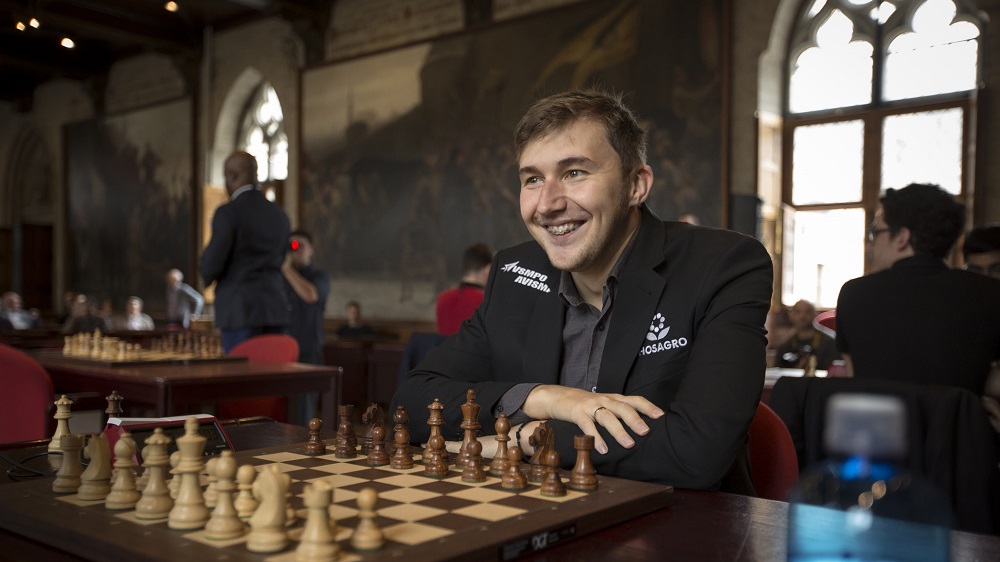
Sergey Karjakin was the best at blitz in Leuven | Photo: Spectrum Studios / Grand Chess Tour
The tension in Leuven began to mount immediately. In round ten, Wesley So had faced his nearest pursuer, Sergey Karjakin, with the black pieces. The Russian used So's 'secret weapon' against him and managed to secure the bishop pair at an early stage with no compensation — a significant advantage in the endgame. Karjakin further improved his king position while the number of weak pawns increased in his opponent's camp:
So was now only half a point ahead of Karjakin, while Levon Aronian had fallen half a point behind Karjakin. In a better, but wild position, the Armenian had contented himself with repeating moves against Shakhriyar Mamedyarov.
Blitz round eleven brought no change at the top, as there all games ended drawn. In the overall standings it was as follows: So 18½, Karjakin 18, Aronian 17½, Vachier-Lagrave 17, Nakamura 16½ points — five players, each separated by only half a point. You could scarcely ask for more drama!
Finally, in round twelve, Vachier-Lagrave defeated Nakamura, while Aronian and Karjakin drew as did So and Anand. Exactly one point separated the first (So) from the third or fourth (Aronian and Vachier-Lagrave); in between was Karjakin. Nakamura, however, remained fifth in the standings, but his chances of overall victory had been significantly reduced by this loss.

Levon Aronian also had chances to make it to the top | Photo: Spectrum Studios / Grand Chess Tour
In round thirteen, as we approached the halfway mark of the day, things began to move in Karjakin's favour. He won a rook ending with an extra pawn against Anand, while Nakamura came out on top against Aronian. That allowed Karjakin to catch up to So, and brought Nakamura back to within striking distance of the top group. The game against the fifteenth World Champion showed again Karjakin's preferred style: no risk, a tiny advantage in the endgame, virtuoso technique. All against the background that it is a blitz game, in which you have to act differently than in a long game:
My Black Secrets in the Modern Italian
The Italian Game is considered a sound but quiet opening without early trades, giving rise to rich positions where plans are more important than forced variations. So shows black's plans on this DVD.
Chess Endgames 8 - Practical Rook Endgames
Rook endings are amongst the most frequently encountered endgames there are, and so your training effort will be quickly repaid in the form of half and full points. Knowing even a few rules of thumb and key methods makes life a great deal easier and provides a guiding light even in complex positions. This DVD focuses on the important themes which are to be found in common rook endings.
However, anyone who believed that Karjakin would be unstoppable in his run didn't count on a certain Alexander Grischuk. Against his compatriot in round fourteen, Grischuk was clearly winning after just 20 moves. This was a huge break for So, who gained ground by beating Anish Giri thanks to connected passed pawns in the rook ending. Plus, Vachier-Lagrave suffered a blow of his own, losing to Mamedyarov.
With four rounds to go the clear lead was handed back to So: 20½; Karjakin 19½; Vachier Lagrave 19; Aronian 18½. Nakamura's hopes were finally dashed in his comeback quest when the American lost to his compatriot Fabiano Caruana.
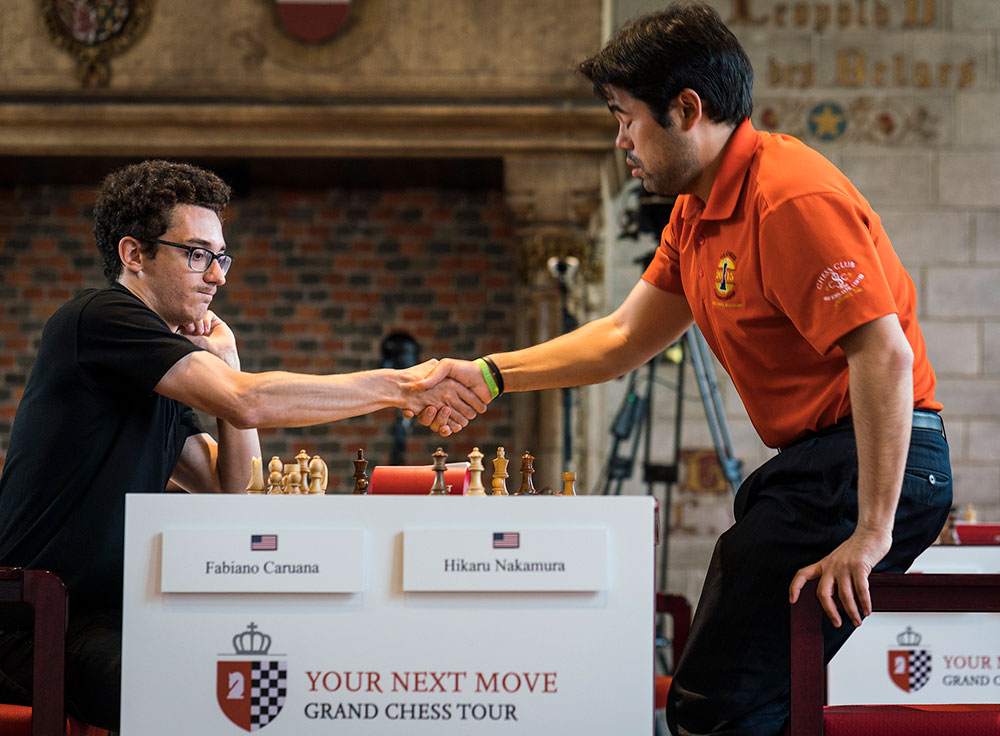
A topsy-turvy day for Nakamura, who ended up second in the blitz, but fourth overall | Photo: Lennart Ootes
The fifteenth round began with a quick draw between So and Vachier-Lagrave. Giri's rough time continued, as he lost to Karjakin in just 27 moves after the Dutchman fatally weakened his kingside in the opening. With three rounds to go, So led with a half-point advantage over Karjakin. Aronian and Vachier-Lagrave also had the theoretical chances to win the tournament, two points behind So in third and fourth place, respectively.
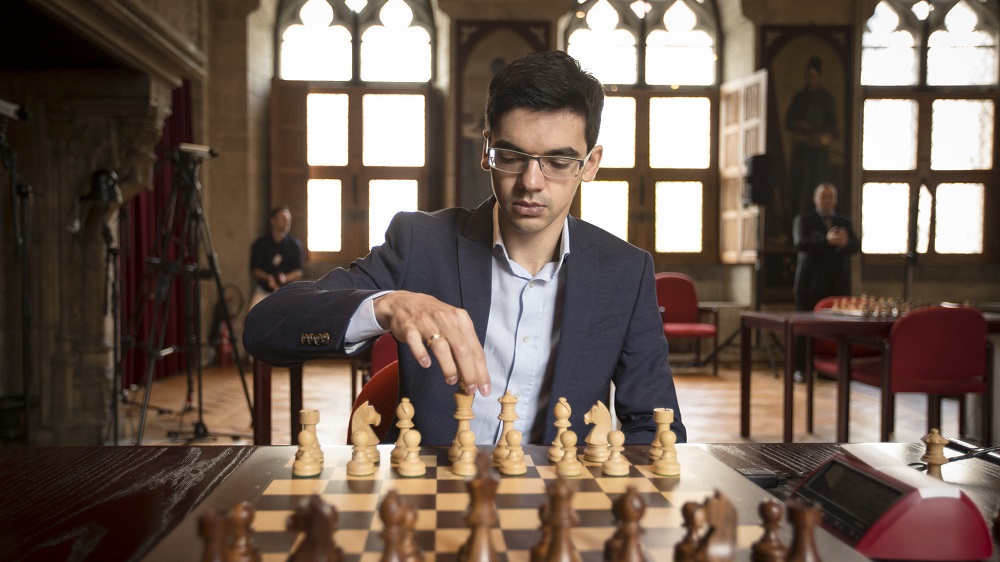
In crisis: Anish Giri | Photo: Spectrum Studios / Grand Chess Tour
Round sixteen brought the kind of game for So that had him thanking God after the tournament for a "minor miracle". Yes, Caruana blundered mate at the very end, but of course one needn't rely on an invisible deity to see how that could happen in blitz. So took his practical chances in an interminable time scramble. Caruana could even have claimed a draw in light of 69.Qb2+ repeating the position for the third time, but he did not.
The battle between the top two American players | STLChessClub YouTube
Since Vachier-Lagrave won against Karjakin in the meantime (Aronian dealt Giri his third consecutive loss), So's lead was up to a comfortable 1½ points over Karjakin, Vachier-Lagrave and Aronian two rounds before the end. It was the only round of the tournament in which all five games were decisive.
So, therefore, needed only two draws to win the tournament. But the Lord works in mysterious ways. In the penultimate round, So lost a worse but probably still defensible rook endgame to Mamedyarov. Meanwhile, Karjakin and Vachier-Lagrave both won their game and cut the lead back to a mere half-point. Aronian was eliminated from contention as MVL's victim.
The standings at the top before the last round thus were:
1. So, 22 points
2-3. Karjakin and Vachier-Lagrave, 21.5 points
4. Aronian, 20.5 points
5. Nakamura, 20 points
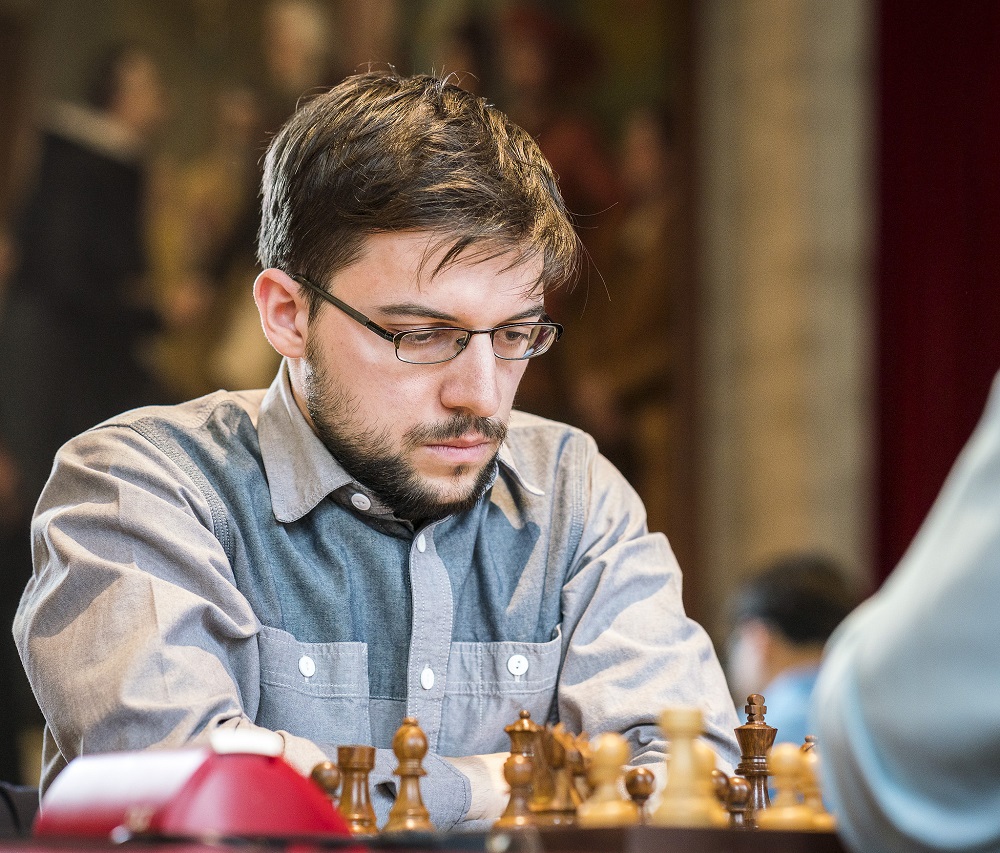
Vachier-Lagrave came third in both rapid and blitz | Photo: Lennart Ootes
In the last round saw a tremendous and unexpected twist: Wesley So lost to Hikaru Nakamura, and the way his game went downhill has an amusing story behind it. Here was the position after 7.c3:
This position also occurred in Nakamura's first game today against Giri, and Anish could be seen with a wide grin while playing his own last round game against Grischuk, when he noticed So fall for the same "cheap trick" as he had accidentally done. The irony doesn't end there. Giri had prepared the line himself specifically for Grischuk in the first round of the Candidates tournament in Berlin and discussed it with Nakamura subsequently. It's nice to see that he could still find the humour in an otherwise miserable tournament for the Wild Card entry.
Nakamura's win was marred by a highly unusual situation in the last seconds of play. Both players were loudly hitting their clocks, with the adrenaline pumping in full blitz mode. Wesley had already been warned about similar behaviour earlier in the day, but in this case, it's not clear if he was at fault as an instigator or merely meeting Nakamura's pace. Although none of the other players was visibly disturbed by the noise, after 45.Kd2 by Nakamura, both arbiters intervened, to insist that both players hit the clock more quietly.
Watch from just before this moment:
The brief arbiter-induced pause in a crucial game
Contrary to what the live webcast commentators guessed, the arbiters were only concerned about the banging of the clock, not which hand was being used. But Nakamura, who was down to 15 seconds compared to So's 43 seconds was clearly flustered by the interruption. And it's hard to blame him. Halting the game — a game to potentially decide first place — at such a crucial phase of the final round for an infraction over which no one was evidently harmed is bound to cause controversy.
[Update: According to at least one player, the noise was disturbing enough to warrant the arbiter's intervention, in his view, bearing in mind that So has developed a habit of banging clock in recent blitz events, for which he has been warned. -Ed.]
When play resumed, almost immediately Nakamura blundered 48.Qc4+:
But the refutation 48...Qg1+ requires some calculation and So took six seconds of his remaining 40 to play 48...h5+ which gives the advantage back to Nakamura. After ten more furious moves, White shook loose his d-pawn and when it became a queen, So was forced to concede.
Despite winning the game, Nakamura was quite aggravated by the arbiter's interference, even commenting publically on Facebook within hours about the incident:
So felt sure he had lost, but another unlikely, if not miraculous result occurred: Mamedyarov played spoiler for his friend Karjakin and Vachier-Lagrave went down against Anand. All three leaders lost in the final round! And so Wesley, avoiding any need for even a tiebreak, simply won by half a point.
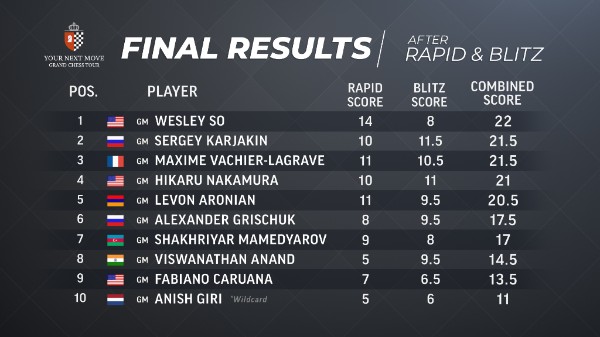
The closing ceremony was attended by Garry Kasparov, who earlier joined Nigel Short to provide some live commentary for the spectators in the City Hall. Tournament sponsor Jan Callewaert also announced that a fourth edition of the tournament was already in the works for 2019. So we can all look forward to more blitz and rapid in Leuven next year.
The tournament was the first stop of this year's Grand Chess Tour, which continues in Paris next week from June 20-24.
IM Robert Ris presents the highlights from the final day of blitz in Leuven.
Translation and additional reporting from Leuven: Macauley Peterson